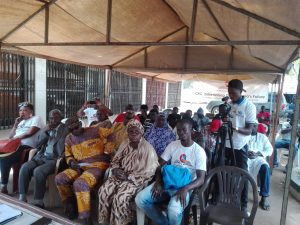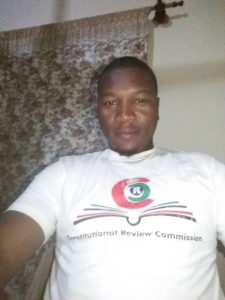By Kebba Ansu Manneh
The last day of the national consultation for the Third Republican Constitution came to a close on Saturday, 26 January 2019, in the capital city of Banjul. As the Constitutional Review Commission (CRC) draws the curtains of consultation, Banjulians added their voices to the array of recommendations emanating from Gambians for inclusion in the new constitution. They expressed their views on hot-button topics such as presidential-term limit, selection of the speaker of the National Assembly, and quota system of allocations for women and youth representations in key national institutions as critical elements for the budding constitution.
The Banjul meeting marked the zenith of the national consultation undertaken by the CRC mandated by the National Assembly to review the 1997 constitution. The current constitutions is widely believed to have been tailor-made for and adulterated by the former president Yahya Jammeh in his efforts to stay in power for what he called his ‘one-billion-year- rule.’
For the national consultation , the CRC held one hundred and four (104) communities plus twenty six (26) schools meetings across the country to engage citizens on their vision for a new governing constitution and system of government. During the consultation, the CRC adopted key words such as #Transparency, #Inclusiveness, #Participatory, and #Ownership as its values for this once in a lifetime or generation exercise.

Many participants from diverse communities from the capital city of Banjul hailed the process as transparent and inclusive, describing it as one of the best opportunity availed to Gambians ever since independence to participate in constitutional building process.
One of the participants at the event was Hon. Fatoumatta Njie, who was elected on the platform of the People’s Progressive Party (PPP) for the National Assembly seat for Banjul South constituency.
“I’m very happy that the Constitutional Review Commission is here today in Banjul South and I have given my contribution but also I feel proud to talk to my people to enlighten them about the importance of this new constitution. I also appreciate the coming of the commissioners to engage us, and it shows us that they are not dictating us about what should be in this new constitution,” Hon. Njie said as she disclosed her satisfaction with the constitutional review process. Weaknesses and gaping loop holes in the 1997 constitution, according to political observers, allowed the former president Yahya Jammeh to amend that constitution more than fifty times.
To the Banjul South parliamentarian, the most important areas needing reforms are term limit for the presidency, and the selection of the speaker and qualifications of members of the National Assembly. Speaking on her proposals for the commission’s inclusion in the new constitution, she said “I think the presidential tenure needs to be very specific and also about the issue of the speaker for being a nominated member because there need to be a total and complete separation of powers.”
According to her, the issue of selecting nominated members should not be done by the president but rather by the various stakeholder bodies the nominees are to represent at the house such as the business community, the youths, the women, the NGO Community and the disables. She argued that such bodies will be in better positions to identify potential candidates to take legislative responsibilities in the National Assembly.
“The Speaker should be nominated by the whole house because obviously in the parliament we have the majority and the minority, and obviously if the vote is given to them they will give it to the most competent person. I also think the national assembly members should get some qualification because from experience there are lot of issues that we look into. So, if you are not qualified you cannot be effective in the parliament,” Hon. Njie contended as she stated her opinion on the selection of the speaker and qualification for members of the National Assembly.
Councilor Isatou Njie, who represents the Banjul City Council at the National Women Council and widely known for her advocacy on women rights, did not minced words or hid her feelings to Commissioners. She said that the new constitution should have a provision for quota system that should allocate 30 percent representation for Gambian women at all governance institutions in the country.

“I want to see that the laws that are meant to promote the welfare of the Gambian women to be enforced. There are certain laws that are to protect women’s right, but they needs to be enforced. For example, the issue of Female Genital Mutilation and Cutting (FGM/C) up till now there are some people who will tell you I listen to you, but I will do it. So, in other to set examples we need to enforce these laws, we have to make sure that anybody who is caught is dealt with by the law,” Said the Banjul City Council Councilor.
She also called for the right to choose whom to married to be provided in the new constitution so that no girl child will be forced to marry against her will, revealing a case on her table concerning a minor who has been forced to marry to one older man.
Speaking on the citizenship of children born to non-Gambian parents, she said “I have lived in England and I lived in the other parts of the world. My opinion is there is what they call citizenship by birth, citizenship by decent, citizenship by naturalization and citizenship by registration. But the most important citizenship is when you are born in a country because we know if you go to the other part of the world, if you are born in a country, you automatically become a citizen. Maybe, we can give chance to people born in this country to become citizens too because to me it doesn’t make any harm.”
The Lady Councilor emphasized that empowering women must be specifically outlined in the new constitution, arguing that women rights issues are mere pronouncements and write-ups hence the authorities are not enforcing the laws protecting the women of the country.
“The death penalty should not be abolish but it should be set in a special way to replace the death because taking a precious life should not be a joke. And secondly, the president should not select the Chairman of the Independent Electoral Commission. I also think the president should not have a hand in the local government especially in selection of Alkalos and Seefoos (Chiefs),” said Abdoulie Boss Gaye, Councilor for Portuguese Town Ward, Banjul South Constituency.

Gaye, an ardent youth activist, clamored for limited powers vested in the hands of the president to appointing the Vice President, Heads of Parastatals, Chief Justice, Speaker of the National Assembly among others, citing that the country is synonymous with abuse of power by presidential appointees who usually sees themselves as above the law.
“Children born in The Gambia should be given automatic citizenship, but they shouldn’t be allow to occupy high positions such as president, National Assembly Membership and Councillorship. And beside that, I think, they should be considered as citizens of this country,” Councilor Portuguese Town Ward discloses his take on pertinent issues drawn from relevant sections of the 1997 constitution under review.
Hon. Ndey Yassin Secka, a nominated member of the National Assembly representing the disables said there is a need to look into the whole issue of disability. She argued that the issue of disability must be tackled as a package since there are various forms of disability affecting Gambian peoples.
“I think a special council should be set up that will be responsible for the welfare of the disables because there are those that are visually disabled, there are those that are hard of hearing, others are physically challenged and even the mentally challenged also falls in this group,” echoed person considered by many as the Voice of the Vulnerable in the National Assembly of The Gambia as the CRC wrapped up the national consultation in the capital city of Banjul.

Every constitutional change has the inherit risk of overcorrections of the previous constitution which could lead to paralyses from constitutional and political crises, or the institutionalization of oppressive governments. Such were the overcorrections of the 1997 constitution which ended up giving the president near imperial powers. Some of the changes recommended to the CRC in the drive to amend the current constitution bear semblances of the overcorrections the 1997 constitution did to the 1970 constitution.
In addition, some political observers are critical of the method the CRC used to consult people around the country who may have limited or no understanding of democratic governance, constitutional rule, separation of powers, the rule of law, governance expertise and statecraft. The ordinary citizens, some analysts believed, should have waited for their turns at the ballot box after they are educated on the provisions of the law before approval. The methodology, especially if the CRC counts the majority opinions for recommendations, may not bring the optimal outcome leading to the crafting of an enduring constitution.
One observer is Foday Samateh who fears that the new constitution might as well turned out to be worse than the one it’s intended to replace. The Times sought his opinions on the topics raised in the Banjul meeting by reaching out to him through social media.
“There should be no nominated members in the National Assembly, period. The President shouldn’t nominate anyone to the Assembly since that contravenes the principle of separation of powers. But no so-called stakeholders should do so, either. The Assembly should strictly be a body elected by the people; and the electoral outcome of the people shouldn’t be diluted in any way by some constitutional contrivance born of the vestiges of colonial norms,” said Samateh who has written and published numerous articles on presidential powers.
“Quota systems are bad in a democracy and should not be sanctified with a constitutional blessing. The underrepresentation of women and other perceived marginalized groups is not based on any law or willful discrimination. It is the function of the political culture. No arbitrary number in the Constitution will address that. The real solution will come from reforms through the political process,” Samateh concluded.
That solution, even though Samateh did not specify, might simply be that political parties recruit enough women candidates for electoral offices instead of allocating predetermined seats in legislative bodies to women just by virtue of their gender. Such an arrangement in the new constitution will sanctioned differential treatment or discrimination against men because they are considered to be in a privileged category even though they, as its victims, may be denied a right said to be a privilege purportedly enjoyed by other men but not the ones deprived of those rights.
EDITORS’ CORRIGENDUM: In the original publication of this article earlier today, The Times by mistake named Abdoulie Boss Gaye, the Councilor for Portuguese Town Ward in the Banjul South Constituency as Abdoulie Boss Njie. The Times hereby also correct the earlier assertion that Isatou Njie is the National Women’s Council representative in the Banjul City Council. Ms. Njie is the Banjul City Council representative to the National Women Council. The Times apologize to both Council members and our esteemed readers.

